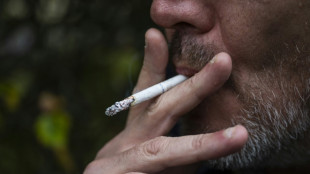
-
 UK's Starmer offers 'plan for change' in reset bid after 150 days
UK's Starmer offers 'plan for change' in reset bid after 150 days
-
South Korea president clings to power after martial law U-turn

-
 Presidential vote seen as referendum on Romania's European future
Presidential vote seen as referendum on Romania's European future
-
Hamilton bids farewell to Mercedes as Ferrari vie for title

-
 New Zealand unchanged in bid to hit back against England
New Zealand unchanged in bid to hit back against England
-
Macron seeks remedy to France's political crisis

-
 New Natalia Lafourcade album celebrates music's onstage evolutions
New Natalia Lafourcade album celebrates music's onstage evolutions
-
Taiwan's Lai kicks off visit to US territory Guam

-
 Ivory Coast staple cassava meal gains UNESCO heritage status
Ivory Coast staple cassava meal gains UNESCO heritage status
-
OpenAI to partner with military defense tech company

-
 Liverpool held but Slot salutes 'special' Salah
Liverpool held but Slot salutes 'special' Salah
-
Man City needed to break losing 'routine', says Guardiola

-
 Leipzig down Frankfurt to reach German Cup quarters, Cologne strike late
Leipzig down Frankfurt to reach German Cup quarters, Cologne strike late
-
Mbappe admits penalty miss 'big mistake' as Bilbao beat Real Madrid

-
 'Sad, disappointed' Mbappe pays penalty as Bilbao beat Real Madrid
'Sad, disappointed' Mbappe pays penalty as Bilbao beat Real Madrid
-
US stocks surge to records, shrugging off upheaval in South Korea, France

-
 Liverpool held in Newcastle thriller, Arsenal inflict Amorim's first defeat
Liverpool held in Newcastle thriller, Arsenal inflict Amorim's first defeat
-
Shiffrin confirms she'll miss Beaver Creek World Cup races

-
 Corner kings Arsenal beat Man Utd to close gap on Liverpool
Corner kings Arsenal beat Man Utd to close gap on Liverpool
-
Mbappe pays penalty as Bilbao beat Real Madrid

-
 NFL Jaguars place Lawrence on injured reserve with concussion
NFL Jaguars place Lawrence on injured reserve with concussion
-
North Korea, Russia defence treaty comes into force

-
 Openda hits brace as Leipzig beat Frankfurt in German Cup last 16
Openda hits brace as Leipzig beat Frankfurt in German Cup last 16
-
Schar punishes Kelleher blunder as Newcastle hold Liverpool in thriller

-
 De Bruyne masterclass helps Man City end seven-game winless streak
De Bruyne masterclass helps Man City end seven-game winless streak
-
Syrian rebels surround Hama 'from three sides', monitor says

-
 Lawyers seek leniency for France rape trial defendants, blaming 'wolf' husband
Lawyers seek leniency for France rape trial defendants, blaming 'wolf' husband
-
OpenAI chief 'believes' Musk will not abuse government power

-
 Thousands rally in Georgia after police raid opposition offices
Thousands rally in Georgia after police raid opposition offices
-
S. Korea opposition push to impeach president

-
 Powell 'not concerned' US Fed would lose independence under Trump
Powell 'not concerned' US Fed would lose independence under Trump
-
French government falls in historic no-confidence vote

-
 Syrian White Helmets chief 'dreams' of never pulling a body out of rubble again
Syrian White Helmets chief 'dreams' of never pulling a body out of rubble again
-
NBA Suns lose Durant for at least a week with ankle injury

-
 Warhammer maker Games Workshop enters London's top stocks index
Warhammer maker Games Workshop enters London's top stocks index
-
Iran Nobel winner released for three weeks, 'unconditional' freedom urged

-
 Red Cross marks record numbers of humanitarians killed in 2024
Red Cross marks record numbers of humanitarians killed in 2024
-
Johnson's Grand Slam 'no threat', says World Athletics boss Coe

-
 Qatar's emir and UK's Starmer talk trade as state visit ends
Qatar's emir and UK's Starmer talk trade as state visit ends
-
Cuba suffers third nationwide blackout in two months

-
 Russia, Ukraine to send top diplomats to OSCE summit in Malta
Russia, Ukraine to send top diplomats to OSCE summit in Malta
-
Spanish royals to attend memorial service for flood victims

-
 LPGA, USGA new policy requires female at birth or pre-puberty change
LPGA, USGA new policy requires female at birth or pre-puberty change
-
Stick to current climate change laws, US tells top UN court

-
 British Museum chief says Marbles deal with Greece 'some distance' away
British Museum chief says Marbles deal with Greece 'some distance' away
-
Pope Francis receives electric popemobile from Mercedes

-
 Gaza civil defence: thousands flee Israeli strikes, evacuation calls
Gaza civil defence: thousands flee Israeli strikes, evacuation calls
-
Trump names billionaire private astronaut as next NASA chief

-
 Pidcock to leave INEOS Grenadiers at end of season
Pidcock to leave INEOS Grenadiers at end of season
-
Seoul stocks weaken, Paris advances despite political turmoil


What we know about mystery hepatitis strain in children
An unknown, severe strain of hepatitis has been identified in nearly 170 children across 11 countries in recent weeks, with at least one child dying of the mysterious disease, according to the World Health Organization (WHO).
Here's what we know so far.
- Where has it been detected? -
The first five cases were flagged in Scotland on March 31 by "astute clinicians, realising they were seeing something unusual", said Meera Chand, director of clinical and emerging infections at the UK Health Security Agency.
The children did not have any of the five known hepatitis viruses, A, B, C, D and E, Chand told an emergency presentation at the European Congress of Clinical Microbiology and Infectious Diseases on Monday.
Such cases are very rare -- the Scottish doctors would normally see four to five unknown hepatitis cases in a year, she said.
The United Kingdom has since reported a total of 114 cases, the WHO said in an update on the weekend.
Spain had the next highest number of cases with 13, followed by Israel with 12 and the United States with nine, while small numbers have also been recorded in Denmark, Ireland, the Netherlands, Italy, Norway, France, Romania and Belgium.
- Who has been affected? -
Children aged from one month to 16 years old have had the mystery disease, but most cases have been aged under 10 -- and many under five. The large majority were previously healthy.
Before the children showed signs of severe hepatitis, they had symptoms that included jaundice, diarrhoea, vomiting and abdominal pain.
Maria Buti, a pathologist in Barcelona and chair of the European Association for the Study of the Liver (EASL), said the "main concern" is the strain's severity.
Seventeen of the children -- 10 percent of the 169 known cases -- had such severe hepatitis that they needed a liver transplant, she told AFP.
Aikaterini Mougkou, anti-microbial resistance expert at the European Centre for Disease Prevention and Control (ECDC), said the cases were "really worrying".
It was not clear whether even more children had mild cases because their symptoms were not traceable, she told the emergency presentation.
"As we do not know the cause, we do not know the transmission route and how to prevent and treat it," Mougkou said.
- What has been ruled out? -
Hepatitis is an inflammation of the liver and is generally rare in healthy children.
No common exposure seems to link the patients, the experts said, and the WHO ruled out international travel as a factor.
Chand said there was no link to paracetamol, overdoses of which can cause liver failure.
Any link to Covid vaccines has also been ruled out, because most of the children were not old enough to be jabbed.
- What is the leading theory? -
Adenoviruses -- common viruses that cause a range of sicknesses like colds, bronchitis and diarrhoea but mostly do not lead to severe illness -- were detected in 74 of the cases, the WHO said.
Chand said adenovirus was found in 75 percent of patients in the UK.
She said the "leading hypothesis" was a combination of a normal adenovirus along with another factor that was making it more severe.
One possibility is that young children who have spent their "formative stages" under Covid measures like lockdowns and mask-wearing over the last two years had not built up immunity to these adenoviruses.
Adenovirus rates in the UK plunged during the early stages of the pandemic but have spiked far above previous levels since measures were lifted, Chand said.
An "unexpected increase" of adenovirus cases has been recently recorded in several other countries, including Ireland and the Netherlands, the WHO said.
Other possible causes for the unknown strain could be a combination of adenovirus and Covid, or related to previous Covid infection, Chand said.
Nineteen of the 169 recorded cases had both Covid and adenovirus, while 20 had just Covid.
All the experts emphasised that ongoing investigations needed more time, but Buti said she expected results within a month.
- What can you do? -
Buti said that because adenovirus is an infectious disease, Covid measures work well against it -- particularly children regularly cleaning hands.
She also called on doctors to look out for signs of jaundice.
F.Pavlenko--BTB




